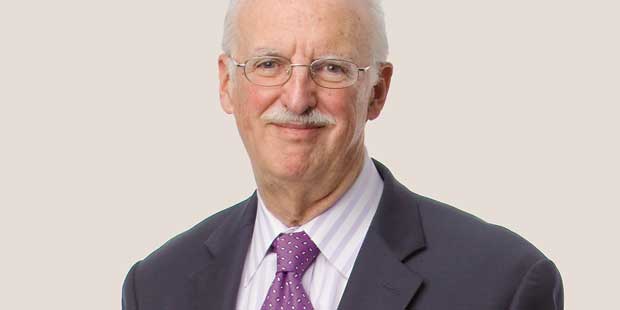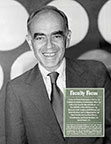Introducing Douglas H. Ginsburg
Professor of Law
Printer Friendly VersionWhen Judge Douglas H. Ginsburg of the U.S. Court of Appeals for the District of Columbia Circuit isn’t wearing his black robe, he prefers red—a scarlet jacket, to be precise. Among Ginsburg’s many extrajudicial interests, none is more arresting than his passion for foxhunting.
“It’s thrilling, a melding of horse and rider into one joint effort that can be fatal if separated,” says Ginsburg, who started riding when he moved to rural Virginia in 1993 and “earned his colors” a few years later. “For four hours at a time, one clears the mind and focuses only on not getting killed.” That respite is significant for a jurist often described as “meticulous and thorough,” with an “academic and intellectual rigor.” Ginsburg has for 25 years heard more than 100 cases annually as one of the top appellate judges in the nation. This September he announced he will be taking senior status from the D.C. Circuit in January 2012, which will allow him more time for his pastimes and to increase his teaching load from part-time at various law schools to full-time on the faculty of NYU Law.
Known among corporate attorneys as a “giant in antitrust law,” Ginsburg has heard appeals in several of the landmark antitrust cases of our times, including U.S. v. Microsoft, a series of suits alleging that the company had excluded competition in bundling its Internet Explorer web browser with its Microsoft Windows operating system, and therefore should be broken into two units. Ginsburg’s court reduced the number of violations found by a lower court and remanded the case for a reassessment of the remedy. Those decisions “set the template for evaluating monopolization practices today,” says Rick Rule, head of Cadwalader, Wickersham & Taft’s antitrust group, who had been Ginsburg’s deputy and succeeded him as assistant attorney general for antitrust at the Department of Justice.
A self-described originalist, Ginsburg coined the term “Constitution in exile” to refer to decisions when the canon has not been interpreted as originally intended. “No one would put on a Shakespeare play without trying to understand what the words meant 400 years ago,” he explains.
Although he is regarded as a conservative, his clerks and other lawyers say he is not an ideologue. “When deciding a case, he makes an honest assessment of the facts in front of him and the governing law. He doesn’t bend the case to become a piece of advocacy for a conservative agenda,” says former clerk David Lehn ’04. On the bench, he asks penetrating questions but is always courteous. He keeps his opinions short—with very few footnotes—and painstakingly redrafts each one 10 to 20 times. As chief judge from 2001 to 2008, he strove to unify the court and to reduce the number of dissenting opinions.
Ginsburg’s esteemed judicial career began with great tumult and disappointment. In 1987, President Ronald Reagan nominated the yearling judge to the Supreme Court. The 41-year-old soon withdrew over admissions that he had smoked marijuana. Ginsburg took the letdown in stride, says Rule: “He remained as outgoing and amiable as ever. And he moved on to become one of the leading lights on the D.C. Circuit.”
What led to the nomination was Ginsburg’s impressive career in government. In 1984 he became the administrator for the OMB Office of Information and Regulatory Affairs in the Reagan White House. At the center of the president’s deregulation effort, Ginsburg was charged with approving all federal agency regulation and policy proposals—an inherently combative task. The stress was such that “the morning staff meetings looked like the locker room of a rugby team after a game,” relates John Cooney, a Venable partner who was then an OMB deputy general counsel. “But Doug wore it well and was a calming factor within the institution.” In fact, none of Ginsburg’s decisions was ever appealed to the president.
A year later, Ginsburg served as assistant attorney general in the Justice Department’s Antitrust Division; one of his lasting executive decisions was to elevate the position of the chief economist.
Ginsburg, a University of Chicago Law School graduate, was among the first students to study law and economics with the now legendary Judge Richard Posner. He has applied the cost-benefit analysis and other “Chicago School” economic principles he learned then to help shape modern antitrust law, and regulatory law and policy, ever since. He has published more than 50 inf luential scholarly works, including co-authoring the seminal 1986 Harvard Law Review article “White House Review of Agency Rulemaking,” which “explained to the world at large how one should assess a regulatory program,” says Cooney.
In 1975, after clerking for Supreme Court Justice Thurgood Marshall, Ginsburg got his first teaching job at Harvard Law School. He and his childhood friend Hal Scott taught one of the first courses in the country on the regulation of financial institutions. “There was no course, no body of writing,” says Scott, who remains at Harvard. So the two did original research by calling regulators to analyze specific problems, once even calling bank regulators in Honolulu when offices in all other time zones had closed.
Now Ginsburg can return to the classroom, where this spring he will teach one of NYU Law’s signature foundation courses, the Administrative and Regulatory State. Possessing firsthand knowledge of regulation, Ginsburg will nonetheless exhaustively prepare for each class, says Scott. Students, says Rule, should follow suit and come thoroughly primed and ready to be engaged.
Ginsburg is fond of pointing out that he was born on May 25, 1946, nine months after V-J Day, making him one of the earliest baby boomers. His mother, Katherine, stayed at home to raise Ginsburg and his two siblings in Chicago. His father, Maurice, was selfeducated and owner of a small financial advisory business. He entered Cornell University in January 1964 but took leave a year later and started Operation Match—the world’s first computer dating company. His enduring interest in computers and technology has, former colleagues say, influenced his well-informed antitrust decisions such as Microsoft.
In 2007, Ginsburg married government affairs consultant Deecy Gray. He has three daughters from earlier marriages. His wry wit and engaging manner make him a coveted dinner party guest. For now, he will commute from the D.C.- area, where his varied interests and pursuits allow him to be, as Rule put it, “a foxhunting Virginia gentleman in the old sense and a thoroughly modern man at the forefront of technology and the law.”
—


 Multimedia
Multimedia